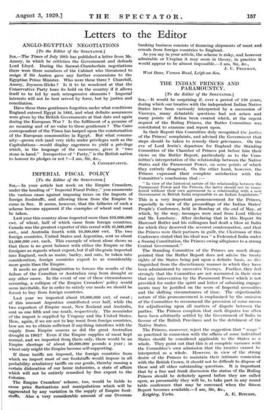THE INDIAN PRINCES AND PARAMOUNTCY.
[To the Editor of the SPECTATOR.] SIR,—It would be surprising if, over a period of 150 years;
during which our treaties with the independent Indian Native States have been variously interpreted by a succession of Viceroys, many debatable questions had not arisen and many points of fiction been created which, at the urgent request of the Ruling Princes, the Butler Committee was constituted to examine and report upon.
In their Report this Committee duly recognized the justice of the Princes' complaints, and advised the Government that steps should be taken to remedy their grievances. On the eve of Lord Irwin's departure for England the Standing Committee of the Chamber of Princes put before him their views on the Butler Report, particularly as to the Com- mittee's interpretation of the relationship between the Native States and the Paramount Power, on some points of which they entirely disagreed. On the other hand, however, the Princes expressed their complete satisfaction with the Committee's conclusions that :-
" In view of the historical nature of the relationship between the Paramount Power and the Princes, the latter should not be trans- ferred without their own agreement to a relationship with a new Government in British India responsible to an Indian Legislature."
This is a very important pronouncement for the Princes, especially in view of the proceedings of the Indian States' People's Conference, held in Bombay at the end of May, at which, by the way, messages were read from Lord Olivier and Mr. Lansbury. After declaring that in this Report Sir Harcourt Butler and his colleagues had dealt a blow at India for which they deserved the severest condemnation, and that the Princes were their partners in guilt, the Chairman of this Conference stated that his ideal was " a Federated India under a Swaraj Constitution, the Princes owing allegiance to a strong Central Government."
The Standing Committee of the Princes are much disap-
pointed that the Butler Report does not advise the treaty rights of the States being put upon a definite basis, as dis- tinguished from the discretionary manner in which they have
been administered by successive Viceroys. Further, they feel strongly that the Committee are not warranted in their view that any intervention by the Paramount Power which is not provided for under the spirit and letter of subsisting engage- ments may be justified on the score of Imperial necessities and the shifting circumstances of time. The objectionable nature of this pronouncement is emphasized by the omission of the Committee to recommend the provision of some means for adjudicating upon all matters of dispute between the parties. The Princes complain that such disputes too often have been arbitrarily settled by the Government of India in favour of the British Provinces and to the detriment of the Native States.
The Princes, moreover, reject the suggestion that " usage " as practised in connexion with the affairs of some individual
States should be considered applicable to the States as a whole. They point out that this is at complete variance with the Committee's own admission that the treaties cannot be interpreted as a whole. However, in view of the strong desire of the Princes to maintain their intimate connexion with the British Crown, it should not be difficult to dispose of these and all other outstanding questions. It is important that by a free and frank discussion the status of the Ruling Princes should be definitely agreed before they are called
upon, as presumably they will be, to take part in any round table conference that may be convened when the Simon
Report becomes available.—I am, Sir, &e.,


































 Previous page
Previous page